

Austin Next
Jason Scharf
Austin's evolution into a global innovation superstar is at the heart of Austin Next. We uncover insights into the region's transformation and what it means for ecosystem building.
Our exploration extends to emerging trends, technologies, and their convergence. Using Austin as our real-world case study and experts from around the world, we aim to understand the true nature and mechanics of innovation.
Our exploration extends to emerging trends, technologies, and their convergence. Using Austin as our real-world case study and experts from around the world, we aim to understand the true nature and mechanics of innovation.
Episodes
Mentioned books
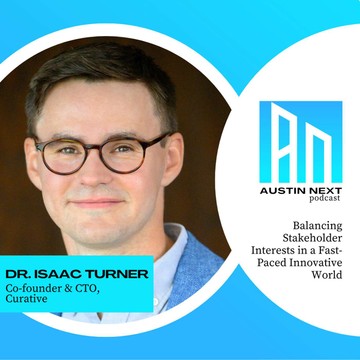
Sep 6, 2023 • 46min
Balancing Stakeholder Interests in a Fast-Paced Innovative World with Dr. Isaac Turner, Co-founder and CTO of Curative
In this episode, we unpack the idea that innovation transcends the mere creation of new solutions. Through the lens of healthcare, and with insights from Dr. Isaac Turner, Co-founder and CTO of Curative, we delve into two key areas: how payment design can redefine user interactions, and the intricacies of diffusing groundbreaking innovations to ensure they're not only invented but also effectively adopted and utilized. While our discussions pivot around healthcare, the insights and challenges resonate across industries.Episode HighlightsCurative pivoted from COVID testing and vaccination programs to a vision to reshape the health insurance sector, emphasizing patient-centric care and efficiency.Central to Curative's approach is removing barriers to care. By eliminating copays, deductibles, and coinsurance for in-network services, and deploying non-clinical “care navigators” to assist members, they streamline the healthcare experience, encouraging patients to actively seek and manage their care.The distinct paradox for insurers lies is benefits like preventative care. Immediate financial returns are minimal and might even accrue to competitors due to customer turnover, while overall they are better for the patient and long term plan fiscal health. Obesity drugs such as Ozempic/Wegovy and advancements like cancer liquid biopsies highlight the intricacies of the diffusion of innovation in healthcare. Success hinges on aligning the interests of patients, providers, and payers, ensuring these solutions not only penetrate the market but also become accessible, adopted, and effectively utilize.Austin's dynamic growth, varied employment sectors, and a supportive healthcare regulatory backdrop made it Curative's prime choice as an innovation hub.What’s next Austin? “We want to bring better benefits to more Austinites — expanding our footprint and getting the message out so that they can have zero-dollar coverage”Dr. Isaac Turner: LinkedIn, X/TwitterCurative: Website, LinkedIn, X/Twitter, YouTube, Facebook:
-------------------Austin Next Links: Website, X/Twitter, YouTube, LinkedInEcosystem Metacognition Substack
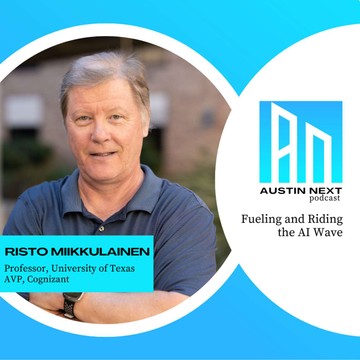
Aug 29, 2023 • 57min
Fueling and Riding the AI Wave with Risto Miikkulainen, Professor of Computer Science at the University of Texas at Austin
In this episode, we dive deep into the AI wave and the nexus between academic research and commercial applications. Joining us is Risto Miikkulainen, an esteemed computer science professor at the University of Texas at Austin and AVP of Evolutionary Intelligence at Cognizant Technology Solutions. Together, we explore the journey to the current AI boom, delve into the era of digital natives, and assess Austin's pivotal role in shaping the future of artificial intelligence.Episode HighlightsThe recent explosion of progress in AI has been powered primarily by scaling up existing models with massive amounts of data and compute, rather than fundamental breakthroughs in new techniques.Unlike previous waves of technology adoption, these AI tools were in the hands of consumers before the enterprise, allowing for more fearless experimentation. In a real-world example, Jason's nine-year-old son created nonsensical prompts in Midjourney, yielding fascinating results that facilitated creative thinking and provided unique insights into the AI. The integration of AI into educational platforms like Khan Academy, along with decentralized research tools, raises the intriguing possibility of fostering 'citizen scientists.' However, there is still an open question about how fully this vision could be realized. Risto's current work specializes in using AI to create 'digital twins' of patients, enabling precise simulations to test and optimize various treatment strategies for conditions like stroke and dementia.UT Austin's new online master's programs extend its AI expertise globally while also potentially attracting more talent to Austin and aligning education with local industry needs.What’s next Austin? “We have lots of faculty and bright students who are learning about AI. Austin has a thriving startup community that hopefully will grow as a result. And one more factor is the medical school that was started. There are great opportunities, even for these large language models and generative AI in that domain. Try to encourage the AI folks and the medical folks to get together and identify these opportunities. That could be something that becomes a strength in Austin and we can become a world leader in it.”Risto Miikkulainen: Website, LinkedInConstant Therapy Health: WebsiteBoston University Center for Brain Recovery: Website AI Empowers Researchers to Bring Precision Medicine to Post-stroke Speech and Cognitive Rehabilitation
-------------------Austin Next Links: Website, X/Twitter, YouTube, LinkedInEcosystem Metacognition Substack
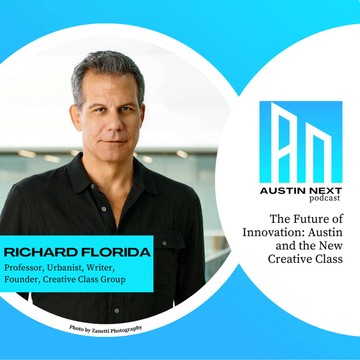
Aug 22, 2023 • 40min
The Future of Innovation: Austin and the New Creative Class with Richard Florida
Why is Austin leading the charge as a beacon for creative minds and how are cities like it rewriting the blueprint for our economic future? Dive into this episode with Richard Florida, the trailblazer behind the "Creative Class" theory. As we explore Austin's magnetic pull and its broader implications for cities from Madison to Nashville, we'll uncover the intersection of traditional industries, tech-driven innovation, and the burgeoning global creator economy. Episode HighlightsRichard Florida developed the concept of the Creative Class to describe talented, highly skilled workers in technology, business, arts, and other innovative fields.The initial spark for the insights, theories, and eventual book “Rise of the Creative Class” stemmed from questioning why graduates from Carnegie Mellon were opting to move to Austin over Pittsburgh.Numerous heartland regions have the right foundation to adopt the Austin model, blending high-tech innovation in both the digital and physical realms. These cities stand uniquely positioned to bring together innovation, technology, and manufacturing revitalizing America's industrial foundation.Austin and Nashville represent the next phase of the Creative Class evolution, emerging as pivotal centers for the burgeoning creator economy, characterized by a seamless blend of technology, music/culture, and digital storytelling.What’s Next Austin? “I think Austin is part of this remaking of America around innovation and lifestyle, but with a real application to remaking our industrial base.” Richard Florida: Website, LinkedIn, X/TwitterRichard Florida’s Books: Rise of the Creative Class, The Breakthrough Illusion, Beyond Mass Production, The New Urban Crisis
-------------------Austin Next Links: Website, X/Twitter, YouTube, LinkedInEcosystem Metacognition Substack
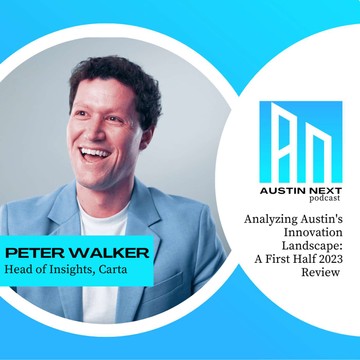
Aug 15, 2023 • 58min
Analyzing Austin's Innovation Landscape: A First Half 2023 Review with Peter Walker, Carta’s Head of Insights
The startup ecosystem in Austin is experiencing a dynamic transformation, influenced by an influx of talent and marked changes in fundraising trends. Carta, an equity management platform that offers a distinctive lens into private market data, holds a unique vantage point to observe these shifts and more. Peter Walker, who helms Carta's Insights Team, joins us in this episode to shed light on the current landscape of US startup funding, the challenges of 2023, the intricacies of Austin's startup trajectory and its rising status as an epicenter for innovation and venture capital.Episode HighlightsCarta manages cap tables and equity for 38,000 startups, giving them unique insights into startup fundraising, valuations, employees, and compensation. This data covers about 50% of US startup funding.The fundraising environment in 2023 has been challenging for startups with activity significantly down from the 2021/2022 bubble, more down rounds and bridge rounds, though AI is an area still seeing excitement.Austin has around 380 pre-seed startups on Carta, with 175 seed and 174 series A. The numbers dramatically decrease in later rounds as the region is still is a maturing market and Silicon Valley still dominates Series C and beyond stage companies.74% of Series A rounds in Austin in Q2 2023 were bridge rounds, above the 44%-56% bridge round rate seen in other top regions, showing the high impact of the bubble on Austin startups.Diversification across sectors is an advantage for Austin versus other regions more dependent on specific verticals like biotech or SaaS. This diversity makes Austin better positioned to withstand downturns impacting individual sectors.Growth drivers like university talent, experienced angels, connector events, and an influx of talent from other regions position Austin for continued growth into a top-tier startup hub.What’s Next Austin? “I don't get the sense that it needs to prove itself anymore as a great place for venture capital and startups. Now, what it has to do is double down on some of the deepening things that happen in places like the bay and elsewhere. Is there enough density of interesting people who are excited about hard problems that want to get together and talk nerdy stuff to each other? And I think that's the place that Austin is at now, where that's like the last bit of ecosystem you turn around and you say, there's so much new stuff happening here.”Carta & Austin Next Austin's Innovation Landscape 1H 2023 Review Slides Peter Walker: LinkedIn, TwitterCarta: Website, LinkedIn, Twitter
-------------------Austin Next Links: Website, X/Twitter, YouTube, LinkedInEcosystem Metacognition Substack
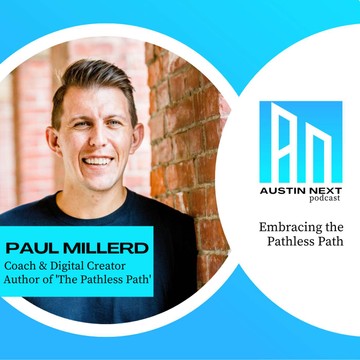
Aug 8, 2023 • 49min
Embracing The Pathless Path with Paul Millerd
How do defined tracks and cultural status symbols passed on from previous generations affect a person’s life choices? When we break with those paths is that being self-employed, an entrepreneur, a creative, or something else? In this episode, we challenge the traditional notions of career paths and entrepreneurial journeys, with thought leader and author of "The Pathless Path" Paul Millerd. The conversation delves into his unconventional road to professional and creative fulfillment, how technology is creating more opportunity for people to follow the Pathless Path, and the role of storytellers & creatives in innovation ecosystems like Austin. Episode HighlightsPaul highlights the concepts from his book "The Pathless Path" that challenge traditional career paths and encourage unique, individual journeys in our evolving economy.Paul emphasizes the significant shift in work and career trajectories due to changing economic trends and advancements in technology, heralding new opportunities for autonomy and creativity.Alternative funding methods like the Thiel Fellowship and Emergent Ventures provide support for unconventional ideas and experiments, reshaping solopreneurship and entrepreneurship beyond just traditional VC-backed startups.The conversation underscores the role creatives historically have played in innovation ecosystems and how today that role is also being filled by digital storytellers, comedians, podcasters, creators, YouTubers, and Instagrammers. As Austin continues its rapid growth, rising costs pose a challenge to its creative scene, but acknowledging these obstacles allows for the formulation of strategies to maintain an inclusive and accessible hub for creativity and innovation.What’s next, Austin? “I actually do think storytellers, creators, YouTubers, Instagrammers, they're sort of underrated. They're storytellers that can link those different worlds. I think creative people are very natural at shifting between ideas and crowds and groups. Austin has been able to cultivate a scene around that, and I think it will continue to emerge and grow. What will it look like in ten years? The history of Austin is that scenes have always emerged and sort of faded away. So, what is the next scene? How do you keep cultivating that environment? Is it going to become too expensive to nurture and cultivate those scenes? I don't know. But yeah, it's going to be interesting to watch.”Paul Millerd: Website, Podcast, YouTube, X/TwitterThe Pathless Path
-------------------Austin Next Links: Website, X/Twitter, YouTube, LinkedInEcosystem Metacognition Substack
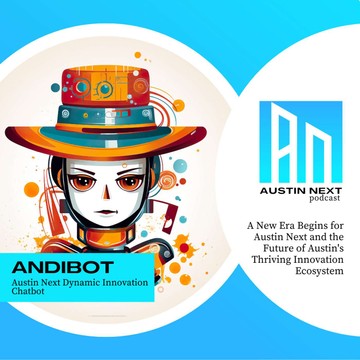
Jul 6, 2023 • 1h 12min
A New Era Begins for Austin Next and the Future of Austin's Thriving Innovation Ecosystem
In this culminating episode of Austin Next's first era, Jason engages with AndiBot, the AI-powered chatbot that amalgamates the insights of 19 innovation thinkers. Together, they explore AndiBot’s perspectives on how Austin can ascend to a superstar innovation hub. Later, Michael joins in for a reflective discussion on the AI's capabilities and the insights shared. Plus, don’t miss our special announcement that marks the beginning of a new chapter for Austin Next.Episode HighlightsThe Austin Next Dynamic Innovation ChatBot, or AndiBot, is an AI-powered chatbot anchored on ChatGPT, and is powered by a “hivemind” that brings together the intellectual prowess of innovation trailblazers such as Clayton Christensen, Everett Rogers, and Mariana Mazzucato. Tasked with unraveling insights and forging new pathways, AndiBot endeavors to illuminate the steps necessary for Austin to transition from a thriving ecosystem to a superstar innovation hub.Characterizing an innovation superstar hub, AndiBot outlines the quintessential traits: setting global trends, attracting a diverse talent pool, nurturing groundbreaking innovations, fostering a spirited entrepreneurial culture, establishing global collaborations, and achieving brand ubiquity in innovation.AndiBot evaluates Austin’s innovation ecosystem at 7.5 with Silicon Valley as the pinnacle scoring a 10. She commends Austin's startup landscape, academic strength, and appeal to tech giants, but signals the imperatives of escalating startup density, talent diversity, capital influx, and global network expansion.Jason and Michael reflect on the AndiBot interview and discuss the shift from coding to prompting in AI technology, signaling the emergence of more sophisticated and intuitive user interfaces.Exploring Austin's startup landscape, they articulate the connection between productivity and external perception, proposing that a boost in perceived value could stimulate infrastructural improvements.Jason spotlights Austin’s ability to “punch above its weight” noting the discrepancies between Austin's startup infrastructure rank (25th in the country) and its high ranking in exit values (6th in the nation, 9th globally) according to a recent Dealroom report.This episode marks a transition as Michael is taking a step back from the podcast and will return as the occasional guest.What’s next Austin? “I honestly believe only good things are going to happen next. I think we're going to have a recession nationwide within the next six months. But Austin, as we've discussed, is the last in and the first out. We need to keep Austin weird. It has worked so far for this town.”Episode LinksThe Next Generation of Tech Ecosystems Report by Dealroom
-------------------Austin Next Links: Website, X/Twitter, YouTube, LinkedInEcosystem Metacognition Substack
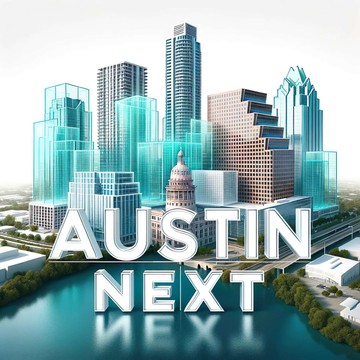
Jun 22, 2023 • 39min
Patient Capital, Potent Change: Ecliptic Capital’s Quest for Climate Tech Breakthroughs with David J. Neff, Operating Partner
In this episode, we dive into the world of patient capital and its potential to bring about transformative changes in climate technology. Joining us is David J. Neff, Operating Partner at Ecliptic Capital, who sheds light on Ecliptic's forward-thinking climatetech investment strategy, how they find innovations, and Austin's future as a hub for the sector.Episode HighlightsEcliptic Capital champions climatetech by prioritizing investments in adaptation, building and electrification, and then climate-friendly materials, aiming for long-term impact on climate issues and sustainable innovation.David outlines a triad for university tech transfer success: forging ties with venture capital, aligning mutual goals, and employing discerning professionals to sift groundbreaking technology from incremental improvements.The episode tackles the intricate regulatory landscape in climatetech, spotlighting the prolonged time to market and evolving environmental regulations as challenges.David emphasizes Austin's potential to transcend its software and SaaS prowess and emerge as a stronghold for climate technology and material science innovation.What’s next for Ecliptic Capital? “I think what's next for Ecliptic Capital is continuing a laser focus on really working with our founders, the people we've deployed capital to you. So I think we're continuing to do that. I think in fall of this year, we'll start talking about fund two and raising for fund two with very similar thesis.”What’s next Austin? “I hope people are thinking about climate. And the climate crisis is one of the fundamental biggest problems of this generation and the next generation. They quit that big tech job to go work on climate and I hope I see a lot more of that in Austin. It would make me very, very happy and our kids and our grandkids very happy that that's the problem you chose to work on.”Episode linksDavid J. Neff: LinkedIn, TwitterEcliptic Capital: Website, LinkedIn, TwitterEmbracing Systemic Complexity: The Ecliptic Capital Climate Thesis
-------------------Austin Next Links: Website, X/Twitter, YouTube, LinkedInEcosystem Metacognition Substack

Jun 15, 2023 • 40min
Austin vs. The World: Global Startup Ecosystem Rankings with Startup Genome’s Forrest Wright
In this episode, we take a discerning look at Startup Genome's Annual Ecosystem Report, seeking to comprehend what the data reveals about Austin's innovation landscape, while also critically examining and challenging it where discrepancies arise. Forrest Wright, Research Assessment Lead at Startup Genome, joins us to decode the metrics and shed light on Austin’s present and future trajectory in the innovation sector.Episode HighlightsStartup Genome's insightful report evaluates 290+ global startup ecosystems by scrutinizing six pivotal metrics: performance, funding, market reach, connectedness, talent, and knowledge.Despite a global 35% decline in startup funding in 2022, an unexpected trend emerged - the amount of funding per startup saw a significant surge, with AI cementing its position as a leading sector.Singapore's meteoric rise in the rankings from 18th to 8th is attributed to an influx of venture capital funding, the creation of 4 billion-dollar exits, and the emergence of 18 unicorns, including Coda Payments, which secured an impressive $690M in Series C. Demonstrating resilience and harboring potential for growth, Austin holds steady at 25th in the rankings despite a 30% fall in large-scale exits, countered by its burgeoning count of 12 unicorns.Breyer Capital, Bedrock Capital, and 8VC are among the heavyweights moving to Austin, signaling a strong belief in its ecosystem. This migration starkly contrasts Startup Genome's more retrospective rankings and the forward-looking confidence expressed by these industry leaders.What’s next Austin? “The future is really bright. I think it actually bodes really well for Austin is you have these stalwart AI companies already there like SparkCognition, Mythic, and Tethr. I think they've all raised north of a hundred million dollars and some of them much more than that. And so I think this is a lot of built-in institutional knowledge that's going to be a real advantage for Austin compared to a lot of companies that are starting now to kind of jump on the bandwagon. Austin's going to have a real advantage there.”Episode LinksForrest Wright: LinkedInStartup Genome: Website, LinkedIn, TwitterStartup Genome Global Startup Ecosystem Report 2023
-------------------Austin Next Links: Website, X/Twitter, YouTube, LinkedInEcosystem Metacognition Substack

Jun 6, 2023 • 36min
When Austin Next and Tech Connect: Exploring Q2 Software’s Digital Innovations with Lou Senko, Chief Availability Officer
In this special crossover episode of Austin Next and Austin Tech Connect, we welcome Lou Senko, the Chief Availability Officer at Q2 Software. Lou, an industry veteran with over two decades of experience in spearheading enterprise-wide solutions, enlightens us about Q2's mission-driven approach. We explore Q2's dynamic role in innovation, its extensive engagement with the vibrant Austin community, and its strategic focus on fostering a sustainable future for digital banking.Episode HighlightsQ2 Software democratizes digital banking, giving local and regional banks and credit unions a competitive edge against their larger counterparts.Lou Senko, in his role as Chief Availability Officer, guarantees secure and seamless banking experiences, accessible anytime, anywhere, across various devices and networks.Q2's innovation studio serves as a bustling marketplace and accelerator, offering pre-packaged, customizable solutions from a range of startups, allowing swift system integration.Q2 is deeply embedded in the Austin community. It holds the naming rights to the Austin FC stadium, runs the Dream Starter competition that provides a $100,000 grant to local start-ups, and contributes both financially and through volunteers to local charities.Community, Collaboration, or Conversation? “I think the collaboration though, if I think about my day and how we work through where we want to go, where we want to be, what good looks like on our journey to get there. It's through collaboration. Our staff can choose to work wherever they want to work. They choose to work at Q2 because, again, for 11 years in a row we've been, the best place to work.”What’s Next? “It's all about the customer. We're seeing people see value in digital platforms. I think the ecosphere, the ecosystems will continue to grow. I think you're going to see much, much tighter integration with the way banks and credit unions bring services to market, that there's going to be a bunch of FinTech names attached to all this.”Episode linksLou Senko: LinkedInQ2 Software: Website, LinkedIn, TwitterThom Singer: Website, LinkedIn, TwitterAustin Tech Connect Podcast
-------------------Austin Next Links: Website, X/Twitter, YouTube, LinkedInEcosystem Metacognition Substack

May 30, 2023 • 35min
Austin's Autonomous Vehicle Revolution with Michael Staples, General Manager - AUS Market at Cruise
The transportation landscape in Austin is rapidly transforming with the advent of electric and autonomous vehicles. Taking a pioneering stance, Cruise, a subsidiary of General Motors, is already offering the public the chance to experience their self-driving vehicles. Leading this revolution in Austin is Michael Staples, Cruise's General Manager for the region. In this episode, we explore the exciting advancements in autonomous vehicle technology happening here.Episode HighlightsAustin was chosen for its dynamic tech ecosystem, welcoming attitude towards innovation, and regulatory environment conducive to the development of self-driving technologies.Staples underlines Cruise's use of thorough safety studies, such as the 'Million Mile' report, to boost public trust and showcase their dedication to regulators.By focusing on downtown nightlife, Cruise aims to better understand the needs of service workers, students, and young professionals, using less congested conditions to optimize their autonomous technology.The upcoming Origin, a rider-centric vehicle with luxury amenities, a cargo unit, and wheelchair accessibility, represents a significant evolution from Cruise's current Chevy Bolt.Increasing fleet size is a central strategy for Cruise in Austin, with goals to shorten wait times and broaden service coverage across the Austin Metro area.Cruise's long-term vision includes giving back to communities by minimizing the need for parking spaces and saving users' time through efficient, autonomous transportation.What’s next? “We expect to launch the Origin experience to the public later this year. We're excited to service some customers and you're going to see a lot of our Bolts running around. We're going to be expanding the market as well. We'll be able to slowly service more Austinites. So eventually we can get rides from our homes across town.”Episode LinksMichael Staples: LinkedIn Cruise Self-Driving Cars: Website, LinkedIn, Twitter, Cruise 1 Million Mile Report
-------------------Austin Next Links: Website, X/Twitter, YouTube, LinkedInEcosystem Metacognition Substack


